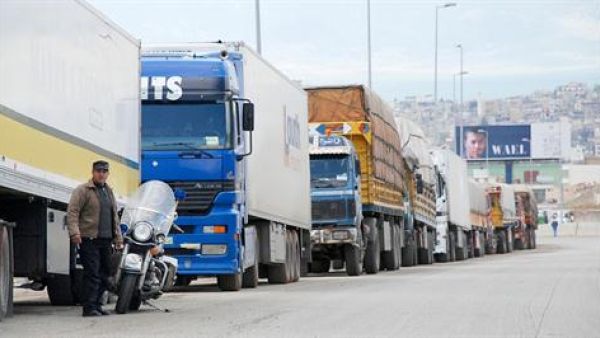Deteriorating security in Syria is forcing Lebanese truckers carrying regional exports to abandon the Damascus road altogether, crossing instead through Homs and Iraq before entering Jordan.
Until recently, the Syrian army would accompany convoys from the Masnaa crossing through Damascus before heading south to Jordan. These included dozens of trucks but left only twice a day and were increasingly subject to attacks by the armed opposition. The crossing has been all but closed to trucks for nearly two months as the fighting around Damascus intensified and fuel tankers heading to Syria came under attack in Lebanon.
Industry Minister Vrej Sabounjian shied away from offering specific remedies following his meeting with representatives from the truckers’ syndicate Friday, limiting himself to emphasizing the importance of land trade to the Lebanese economy.
“The land route is vital,” Sabounjian told reporters following the meeting. “I hope that neither the trucks nor drivers are exposed [to difficulties], because the drivers are just doing their job.”
Sabounjian added that some measures to address the problem “might” be announced within the next two days, but he declined to elaborate.
“Our work has completely stopped,” said Chafik al-Kassis, the head of the truckers’ syndicate. He described the impact on the sector as “grave” but also did not offer figures.
“It’s true that [the route through Iraq] costs a bit more than going from Masnaa through Damascus, but we don’t really have a choice,” he added.
In addition to the threat posed by fighting in Syria, Damascus closed the Masnaa crossing after tankers carrying fuel from Lebanon to Syria were targeted by local groups to prevent resources from reaching the Syrian regime.
Kassis denied that any Lebanese party was behind the attacks, suggesting the Free Syrian Army and its supporters in Lebanon were responsible.
“It’s legal,” he said of the transport of fuel into Syria.
United Nations sanctions do not apply to private Syrian companies.
Kassis said he had discussed the issue with the Lebanese Army, which had started stopping fuel tankers before they reached Tripoli to avoid clashes.
The crippling of land transport has cut deeply into the economy, particularly the agricultural and manufacturing sectors, leading a number of Lebanese officials to raise the issue with Syrian representatives over the past week.
President Michel Suleiman met with Secretary-General of the Higher Council for Lebanese-Syrian Relations, Nusri Khoury, Friday, reportedly to discuss the issue of export through Syria.
The Central News Agency reported Friday that Lebanese General Security chief Abbas Ibrahim’s visit to Damascus Wednesday had yielded results and that fuel tankers would leave Lebanon for Syria Friday night, and the Masnaa crossing would be opened Saturday to trucks entering Lebanon.








